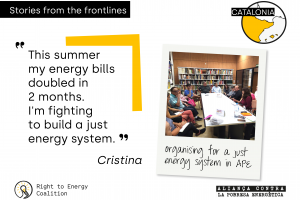6 December, 2021
Stories from the frontlines: “My energy bills doubled in 2 months”
Cristina lives near Barcelona with her three young daughters, and is confronted with a staggering energy bill. Before the summer, her electricity bill stood at 40 euros a month. When Spanish tariffs changed in June 2021, the price rose to 75 euros. The following month, when prices reached record highs, her bill increased to 100 euros. Her electricity bill more than doubled in a matter of months.

Her only source of income is the basic income she receives from the Catalan government. “I can no longer afford electricity. I already have two unpaid bills”, says Cristina.
Cristina had already experienced energy poverty during the crisis of 2008, when she lost her job and her energy debt exceeded 1,000 euros. A few years later, she joined the Alliance against Energy Poverty to radically challenge an unfair energy system and address the root causes of energy poverty. She wants to show how the struggle to pay energy bills is not a personal issue, but the result of structural inequality caused by a neoliberal energy system and inefficient housing. She works to build a just energy system, and to hold energy companies accountable.
The Alliance against Energy Poverty (APE) was founded following the 2008 economic crisis to defend the right to energy for all, at a time where energy poverty impacted a growing number of families. Their demands include writing off energy debts, a just transition for workers and communities, fair energy prices for all, and new laws to regulate private energy companies for social and climate justice. Their actions are rooted in grassroots solidarity: APE organises direct actions and collective assemblies bring affected households and activists together, to meet, share stories, learn how to reduce their energy bills, and strategise together.
APE’s work has already led to substantial political change: in 2015, the Parliament of Catalonia banned electricity disconnections for vulnerable households. In 2021, APE led a successful campaign that freed 35,000 families of their energy debts. Their mobilisation also led the city of Barcelona to create advice centres for households and launch a public campaign informing people of their rights. Today, despite political progress, the economic crisis combined with skyrocketing energy prices is putting hundreds of thousands of families at risk, underlining the need to organise more than ever.
Very few countries have implemented safeguards to limit disconnections and prevent the accumulation of energy debts — which puts millions at risk as energy prices skyrocket. Catalonia is a leading example of how we can work to deliver the right to energy as a human right across Europe and challenge neoliberal energy companies. To effectively ensure the right to energy for all, the Right to Energy coalition demands a ban on disconnections and the supply of a minimum amount of energy for all.

